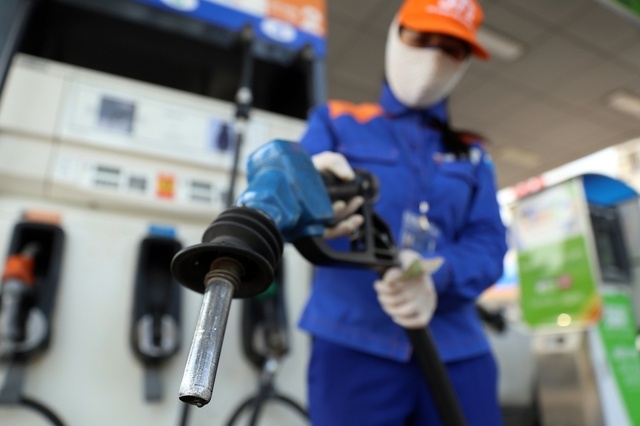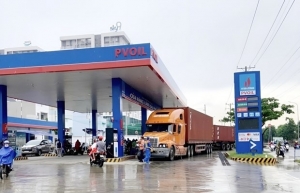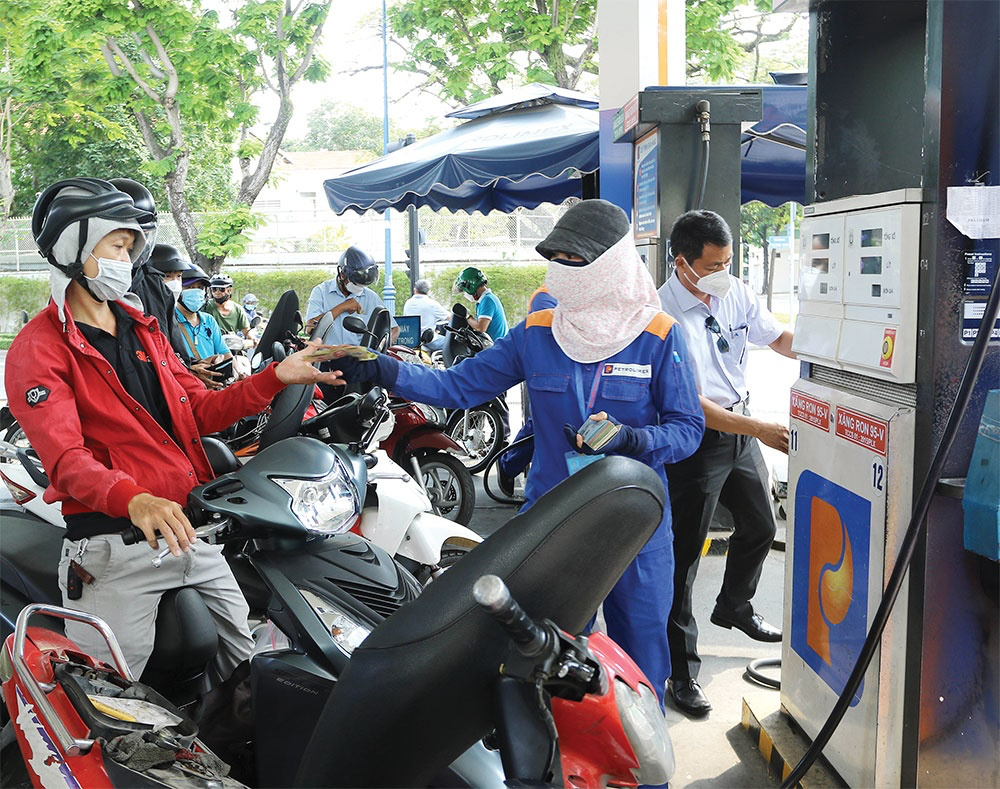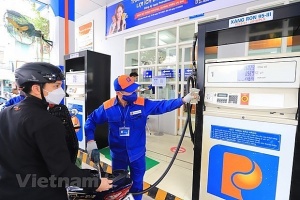Vietnam faces petrol shortage risks
 |
The periodic maintenance of the Nghi Son oil refinery and petrochemical complex from mid-August to October may cause Vietnam to once again experience supply disruptions and excessive prices. What distinguishes this disruption (if it occurs) from the previous one, which lasted from the end of 2022 to the middle of the first quarter of 2023, are the cause and the countermeasures.
Market entrance obstacles
After the global energy price crisis, Vietnam has witnessed months of consistent supply and selling prices as a result of the recovery of its domestic petroleum production, and import activities have also returned to normal. However, this period of petroleum abundance may soon come to an end. Vietnam's petroleum self-sufficiency is under duress as a result of its limited investments in oil and gas production and its sluggish economic recovery.
| "The MoIT has designated crucial enterprises, based on their allocated output and the results of the first six months of this year, to import proactively in July to meet market demand. The MoIT also tasked Vietnam Oil and Gas Group and Dung Quat Refinery with proactive planning on raw materials, techniques, and personnel. In all circumstances, it is necessary to ensure adequate petroleum supply in the final months of the year," said Minister of Industry and Trade Nguyen Hong Dien. |
As a consequence, Vietnam must import more to ensure domestic production and consumption are adequately supplied. In 2023, the Ministry of Industry and Trade (MoIT) designated key enterprises the task of purchasing and importing between 25.9 and 26.7 million cu.m of petrol and oil, a rise of between 10 and 15 per cent from 2022.
For the first time, a litre of petroleum cost approximately $1.26 in Vietnam. In 2020, the price of petroleum was approximately 63 cents per litre, while the price of crude was approximately 51 cents.
Officials at the MoIT and the Ministry of Finance did not anticipate the scope of the disruption of petroleum supply, making it even more challenging to manage. This is a significant issue for state management in Vietnam, with petroleum prices and taxes causing the most concern.
In reality, the control and administration of petrol prices in accordance with Decree 83/2014/ND-CP and Decree 95/2021/ND-CP helps the government ensure energy security but also causes "retail businesses to suffer losses, close down, and withdraw from the market since profits are insufficient to cover business expenses," as stated by the director of the Vietnam Centre for Economic and Strategic Studies (VESS), Nguyen Duc Thanh. The fact that petroleum is owned by large corporations demonstrates how monopolised this market is.
The director of VESS cited the case of Petrolimex, the dominant enterprise in hydrocarbon trading in Vietnam, with 43 direct trading entities accounting for approximately half of the domestic market share. The distribution infrastructure of Petrolimex includes more than 5,500 gas stations, which is a significant portion of the total 17,000 gas stations in Vietnam.
Price and tax on petrol are regarded as significant factors in harmonising the benefits between businesses and consumers. According to the research report "Notable characteristics of the petroleum market and the impact on household welfare," published by VESS on June 27, the base price calculation method has numerous flaws that prevent petrol and oil from reflecting reality and keeping up with changes in the international market.
Every litre of petrol and oil sold in Vietnam is subject to taxes, including value added at 10 per cent; import at 10 per cent; special consumption at 8–10 per cent; and environmental protection at 8.4 cents per litre for petrol, 4.2 US cents per litre for oil, and 2.5 cents per litre for kerosene. According to VESS analysts, these tariffs have a direct impact on corporate and household expenditures.
| Vietnam has 38 hydrocarbon trading centres in 2023, four of which only trade in aviation petrol. According to the MoIT, there were 13 businesses in 2012. From December 2022 to January 2023, data from MoIT's Nghi Son Refinery Plant encountered a technical issue, resulting in a 120,000–200,000 cu.m tonne decrease in domestic supply in January 2023. According to the General Department of Customs, Vietnam spent nearly $9 billion importing 8.9 million tonnes of all types of petroleum in 2022, an increase of nearly 28 per cent in volume and 118.5 per cent in value, equivalent to nearly $4.9 billion, compared to 2021. |
The research conducted by VESS highlights the disparity between the manner in which the petrol tax is levied in Vietnam and other nations in the region and around the globe.
"Proportional tax calculation, such as import tax, excise tax, and VAT, can render budget revenues passive when global prices fall precipitously or rise sharply," Thanh said.
"Vietnam is one of the few nations that imposes relative petrol tariffs. It is uncommon for a country to directly impose two excise taxes and environmental protection taxes on the same product."
The current trend among businesses is to purchase petroleum from countries that have signed free trade agreements, such as Korea, Singapore, and Malaysia, to take advantage of lower import taxes than the average.
Analysts at VESS believe that only one of two categories of excise tax or environmental protection should be incorporated into petrol's base pricing structure. For instance, imposing a tax of 8.4 cents per litre, or adjusting to the particular circumstance and implementing a price ceiling of 13 cents per litre if a relative tax is imposed.
"The government must create a market that allows petrol prices to be moderate relative to people's incomes, especially for low-income households, to improve household welfare," Thanh said.
Let the market decide
Energy security has always been a high priority for Vietnamese government officials. Thanh is concerned that with the present reserve level, "it can be challenging to ensure national energy security when the global petroleum market fluctuates."
According to the VESS, Vietnam's total petroleum reserves are modest, at about 65 days of net imports, which is low compared to the International Energy Agency's national petroleum reserve standard of 90 days of net imports.
Researchers and businesses agree that the state should only monitor the quality of petrol and create a trading level to address the pricing problem if the market is allowed to determine its price. However, Nguyen Van Phung, former director of the Department of Large Enterprise Tax Administration within the General Department of Taxation, disagrees.
"Petroleum is an essential commodity; business is conditional; therefore, the state regulates the price, and it is impossible to completely follow the market," he said.
However, Bui Ngoc Bao, chairman of the Vietnam Petroleum Association, said the retail price of petrol should be decided by the market. According to him, petroleum prices in Vietnam are heavily influenced by global factors. Currently, the input materials of two domestic refineries, which account for 70 per cent of their supply, are priced at world rates. In addition, the Law on Prices classifies petrol as a commodity that stabilises prices. Therefore, when fluctuations in the petroleum market negatively impact the economy, the government uses this instrument to intervene.
 | Price management tweaks urged for petrol retailers Petrol retailers and industry insiders are calling for a change in the state management of fuel to ensure businesses can stay afloat. |
 | Petrol retailers to buy from multiple sources The Ministry of Industry and Trade (MoIT) informed the National Assembly's Economic Committee on April 21 that petrol retailers will be able to obtain products from multiple suppliers, including distributors and wholesalers, as opposed to the current sole source. |
 | Petrol suffers too many taxes: experts Each litre of petroleum is subject to too many taxes, with burdens on businesses and consumers are increasing, according to industry experts. |
What the stars mean:
★ Poor ★ ★ Promising ★★★ Good ★★★★ Very good ★★★★★ Exceptional
Latest News
More News
- Vietnam sets ambitious dairy growth targets (February 24, 2026 | 18:00)
- Masan Consumer names new deputy CEO to drive foods and beverages growth (February 23, 2026 | 20:52)
- Myriad risks ahead, but ones Vietnam can confront (February 20, 2026 | 15:02)
- Vietnam making the leap into AI and semiconductors (February 20, 2026 | 09:37)
- Funding must be activated for semiconductor success (February 20, 2026 | 09:20)
- Resilience as new benchmark for smarter infrastructure (February 19, 2026 | 20:35)
- A golden time to shine within ASEAN (February 19, 2026 | 20:22)
- Vietnam’s pivotal year for advancing sustainability (February 19, 2026 | 08:44)
- Strengthening the core role of industry and trade (February 19, 2026 | 08:35)
- Future orientations for healthcare improvements (February 19, 2026 | 08:29)















 Mobile Version
Mobile Version